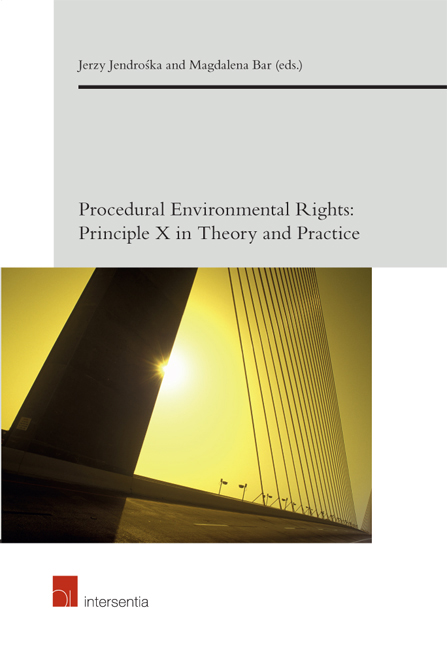Book contents
- Frontmatter
- Contents
- Introduction Procedural Environmental Rights in Theory and Practice
- Procedural Environmental Rights: Status and Developments
- Procedural Environmental Rights in Practice
- Public Participation
- The EU and Public Participation in Environmental Decision-Making
- Public Participation in Rulemaking and Decision-Making in Environmental Matters – Legal Framework and Jurisprudence in Spain and the Basque Country
- Legal Instruments to Protect Indigenous Peoples’ Participation in Europe and in the Arctic Region
- Notifying the Public as a Part of the Public Participation Procedure in EU, Polish and Ukrainian Law
- Public Participation Rights Enhancement within the Wind Power Plants Location in Poland in the Context of EU Renewable Energy Requirements
- Access to Justice
- Procedural Environmental Rights and Nature Protection
- Procedural Environmental Rights and EIA
- Procedural Environmental Rights and Climate Change
Notifying the Public as a Part of the Public Participation Procedure in EU, Polish and Ukrainian Law
from Public Participation
Published online by Cambridge University Press: 12 October 2018
- Frontmatter
- Contents
- Introduction Procedural Environmental Rights in Theory and Practice
- Procedural Environmental Rights: Status and Developments
- Procedural Environmental Rights in Practice
- Public Participation
- The EU and Public Participation in Environmental Decision-Making
- Public Participation in Rulemaking and Decision-Making in Environmental Matters – Legal Framework and Jurisprudence in Spain and the Basque Country
- Legal Instruments to Protect Indigenous Peoples’ Participation in Europe and in the Arctic Region
- Notifying the Public as a Part of the Public Participation Procedure in EU, Polish and Ukrainian Law
- Public Participation Rights Enhancement within the Wind Power Plants Location in Poland in the Context of EU Renewable Energy Requirements
- Access to Justice
- Procedural Environmental Rights and Nature Protection
- Procedural Environmental Rights and EIA
- Procedural Environmental Rights and Climate Change
Summary
ABSTRACT
This article analyses whether EU, Polish, current and planned Ukrainian law are compliant with the Aarhus Convention requirement to public notification during the public participation procedure. This article concerns the personal scope of public notification: the entity responsible for notifying and the entity entitled to get notified. Secondly, it covers the timeliness and effectiveness of public notification. The first one means that the notification shall take place early enough in the public participation procedure as well as in the whole decision-making procedure. The second one is connected to spreading public notification among the entities entitled and willing to participate in the decision making. That could be done via public notice published in printed media, posted at the territory where an activity is planned or at the territory that could be affected by it, disseminated through mass media (TV, radio) or through electronic means, as well as via individual notice.
KEYWORDS
Aarhus Convention; EIA Directive; individual notice; public; public concerned; public notice; public notification; public participation procedure
INTRODUCTION
In accordance with the requirements of international, European and Polish national law when making decisions in environmental matters public authorities should provide the public with an opportunity to participate. Notification on the initiation of the decision-making and of the public participation procedure is the first stage of the public participation procedure.
At international level this stage is mainly regulated in the UNECE Convention On Access to Information, Public Participation in Decision-making and Access to Justice in Environmental Matters. It was signed on 25 June 1998 in the Danish city of Aarhus (hereinafter – the Aarhus Convention).
According to Article 6.2 of the Aarhus Convention:
“The public concerned shall be informed, either by public notice or individually as appropriate, early in an environmental decision-making procedure, and in an adequate, timely and effective manner, inter alia, of:
(a) The proposed activity and the application on which a decision will be taken;
(b) The nature of possible decisions or the draft decision;
(c) The public authority responsible for making the decision;
(d) The envisaged procedure, including, as and when this information can be provided:
(i) The commencement of the procedure;
(ii) The opportunities for the public to participate;
- Type
- Chapter
- Information
- Procedural Environmental RightsPrinciple X in Theory and Practice, pp. 171 - 192Publisher: IntersentiaPrint publication year: 2018



